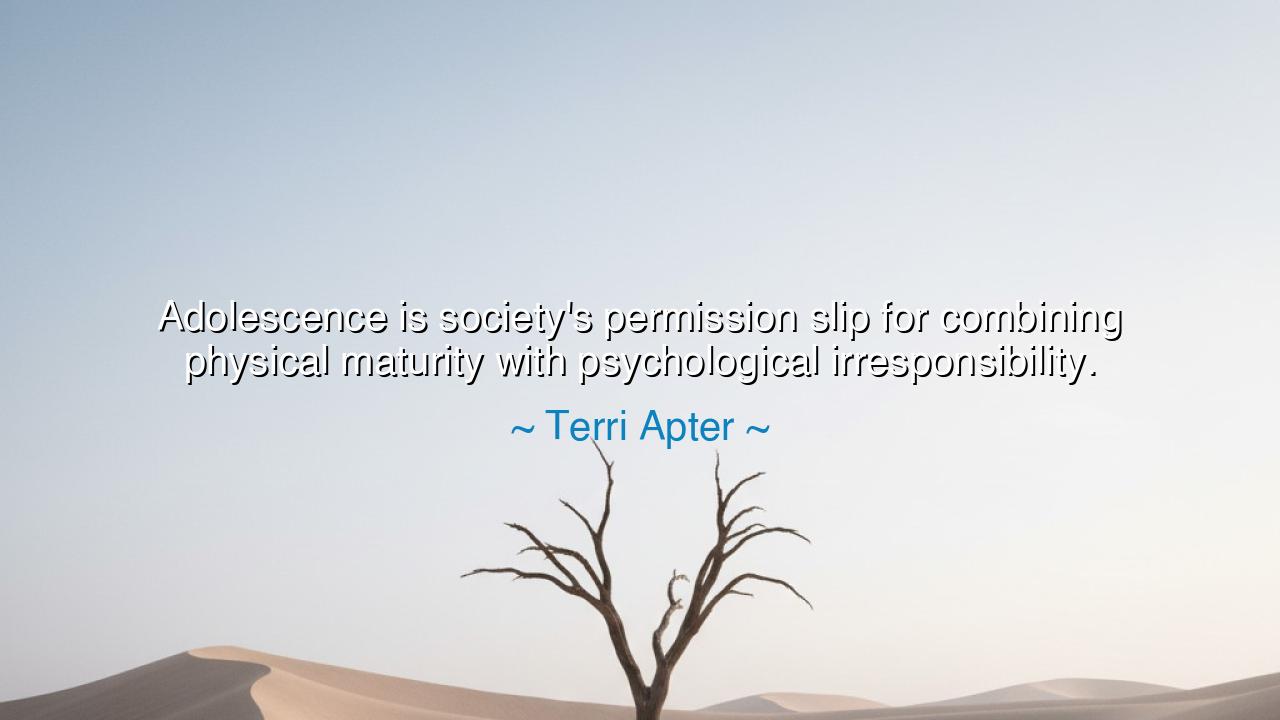
Adolescence is society's permission slip for combining physical
Adolescence is society's permission slip for combining physical maturity with psychological irresponsibility.






Hear the piercing words of Terri Apter, psychologist and chronicler of the human condition: “Adolescence is society’s permission slip for combining physical maturity with psychological irresponsibility.” These words, though spoken in the modern age, strike with the timeless wisdom of an oracle. They remind us of that peculiar threshold of life—neither child nor adult—when the body surges forward into strength, but the mind lingers in recklessness, still tethered to impulses and passions not yet mastered. And rather than condemning this state outright, Apter reveals that it is a condition sanctioned by society itself, a season of experiment, of risk, of stumbling toward identity.
The meaning here is profound. Adolescence is not only a biological stage; it is a cultural invention, a bridge that society allows between dependence and independence. In this stage, the young wield the fire of physical maturity—strength, beauty, fertility—yet are excused when they lack foresight, when they falter in judgment, when they grasp at danger with unsteady hands. It is as if the community whispers, “You are permitted to err, for you are still becoming.” Thus, the recklessness of youth is not merely tolerated, but woven into the fabric of human growth.
The ancients too saw this paradox. Aristotle spoke of the young as “hot-blooded, prone to excess, and lovers of honor,” yet he also saw in them the seeds of greatness. In Sparta, young men were tested with trials of endurance and combat, their irresponsibility channeled into discipline. In Rome, youths of noble birth were sent to serve in the army, their raw strength hardened into service to the state. Thus we see that cultures across time have recognized this volatile mixture of power and immaturity, granting it both restraint and freedom, knowing that from it must emerge the adults who will bear the weight of civilization.
Consider the story of Alexander the Great. At sixteen, he commanded armies; at twenty, he conquered empires. His physical maturity was undeniable, yet his psychological irresponsibility was legendary—his temper, his thirst for glory, his reckless drinking, his dangerous impulse to demand worship as a god. He blazed like a comet across history, brilliant and destructive at once. In him, we see both the peril and the promise of adolescence magnified: a youth permitted to seize the world before his wisdom had caught up with his might.
Apter’s words remind us that the permission slip granted by society is double-edged. It allows growth, experimentation, and the forging of identity. But it also risks indulgence, the normalization of recklessness, and the delay of responsibility. The challenge for elders, parents, teachers, and leaders is to guide this stage—not to extinguish the fire of youth, but to shape it into a flame that warms rather than burns. For left unchecked, psychological irresponsibility can harden into lifelong patterns; but when guided, it becomes the fertile soil of creativity, courage, and resilience.
The lesson is this: do not despise the folly of the young, nor romanticize it. Instead, recognize it as a sacred stage in the journey of becoming. Offer guidance, boundaries, and examples of virtue. Celebrate the daring spirit of youth, but temper it with wisdom. And to the young themselves: understand that your freedom to err is not a license for ruin, but an opportunity to learn. Each mistake is a lesson, each reckless act a step toward maturity, if only you choose to reflect and grow.
What, then, must we do? As elders, we must balance patience with discipline, giving room for experimentation while demanding accountability. As youths, we must embrace the gift of adolescence not as an endless escape from responsibility, but as preparation for the burdens and honors of adulthood. For the permission slip expires, and the day comes when the strength of the body must be matched by the strength of the mind.
Thus remember: adolescence is a crucible, not a curse. It is the season where society allows the body to race ahead of the soul, trusting that the soul will catch up. Terri Apter’s words call us to see this stage with both compassion and caution, knowing that the future of civilization rests on whether its young can transform recklessness into wisdom, and freedom into responsibility.






AAdministratorAdministrator
Welcome, honored guests. Please leave a comment, we will respond soon